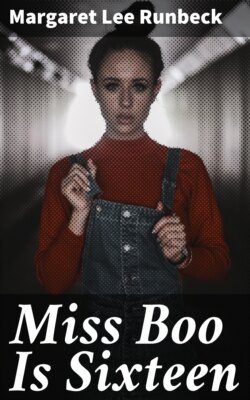Читать книгу Miss Boo Is Sixteen - Margaret Lee Runbeck - Страница 15
На сайте Литреса книга снята с продажи.
Mushrooms and Metaphors
ОглавлениеTable of Contents
When I go back to New England, I tell my friends I am visiting them. But actually I am homesick for the woods. Not the cathedral forests of the Northwest, or the open unreticent groves of eucalyptus and palms; what I long for are the damp secretive little woods that come to your very door-yard, if you live in the suburbs, to eat out of your hand. The intimate small woods straggling thinly over the landscape ... the shadbush and ferns, the oaks that keep their pink crackling leaves through much of the winter ... these are what I love, and I have to find excuses for keeping assignation with them.
Like going out with neighbors to look for mushrooms, when I knew I should stay in the house and get a little work done. But there are ways of getting around getting work done and I am familiar with most of them.
For instance one says to oneself, “After all it isn’t every day two officers of the New England Mycological Society invite you to gather specimen mushrooms. You would learn something new ... that’s your job, isn’t it ... learning new things, seeing new sights, turning up new figures of speech?”
As you button up the sweater, you think complacently, You wouldn’t be just amusing yourself. You wouldn’t even be out looking for mushrooms to eat ... it’s a fresh new metaphor you’d be hunting.
I’ve chased wild metaphors many a time; I know their trails lead into engaging bypaths, for they are untamable creatures, indigenous to no restricted climate but found in any. They cannot be caught with trap or cage; they are like leprechauns whom to look at is not to see. Metaphors, too, must be looked at out of the corner of the mind, so to speak. The art of misapplication rules them. Talking about one subject, they instruct about another. They are puns in picture form.
Metaphors are the shadow which clarifies substance. They are tiny mirrors into which imagination may look and see ... itself. For the more you know, the more you see in a metaphor; indeed in simile it is knowing which becomes seeing.
Metaphors are as tactful as they are informative, for if you know nothing at all about the subject, you are not offended or rebuked, because they offer your eye an agreeable still life, valuable for itself. Metaphors are the diplomats of rhetoric; they lead you urbanely to the brink, but it is you who states some unique conclusion to your own discovering self. There is nothing more satisfying than finding a provocative metaphor. (Unless it be the finding of a clump of gnomish mushrooms hunched at the foot of a chestnut stump!)
Trying to explain, one often fumbles ... then some little picture comes nimbly to the hand and one picks it up surely like a flashlight. With its tiny, incisive ray, a good simile can illumine almost any elusive meaning. Where reason stumbles, imagination flies unfettered. One is talking about desultory reading with no program or destination ... book after book, each all right but unassociated ... then one has it. “Why!” you say delightedly, “it’s like sewing a long seam with no knot in the end of the thread!”
Or you try to tell someone about the pleasure of keeping a journal. “But there are so many books already written,” one is told. You stammer witlessly for rebuttal, then your friend the metaphor helps you.
“Of course ... but it is the difference between planting even a windowbox of our own, and walking through the public’s botanical gardens!”
Our afternoon was too full of mushrooms to think about the metaphors. There was too much beauty splashed across the sky, too many impressive Latin names bandied about ... too many enchanted dwarfs scampering through the leaves to be transfixed into mushrooms when you pounced....
We came home with baskets bulging. Then, within sight of the house I remembered on what pretext I had come out. Here we were laden with mushrooms, both edible and specimen ... but quite quite empty of metaphor.
Well, the next best thing, then, is to learn more about mushrooms. You never know when knowledge will come in handy.
“What I don’t understand,” you say earnestly, “is how these little chaps grow. Are they root, branch, or flower? And where is the rest of them?”
“They’re flowers,” the six-foot-tall mycologist explains. “They spring from an underground plant, a white thread-like mycelium. It grows along quite unseen, under the ground, until it is ready to put out its blossoms....”
“Mycelium,” you repeat, and a glow of joy comes over you. “Just the way thought grows along, unsuspected and unseen until it shows itself above the surface in some sudden action. ...”
You are delighted beyond words now. “And how in the world have historians ... or dramatists ... how have poets ... or lovers ... or even economists ... how has anyone ever got along without that wonderful metaphor? Mycelium!”
This is why you went to the woods; this is what you were seeking under the leaves, beside the tree stumps. You have forgotten the mushrooms now. Let ’em be broiled and served on toast! What you have found was prophesied in the book of Proverbs: A word fitly spoken is like apples of gold in pictures of silver.
Let the mushrooms be eaten; this shall be framed and hung upon a page.
